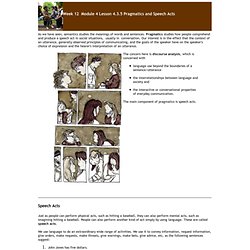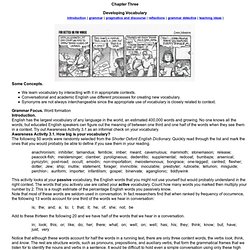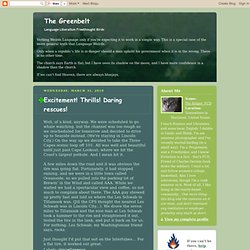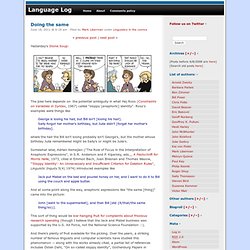

Tell it like it is cartoon. Mod 4 Lesson 4.3.4 Pragmatics and Speech Acts. As we have seen, semantics studies the meanings of words and sentences.

Pragmatics studies how people comprehend and produce a speech act in social situations, usually in conversation. Our interest is in the effect that the context of an utterance, generally observed principles of communicating, and the goals of the speaker have on the speaker's choice of expression and the hearer's interpretation of an utterance. Speech Acts. Image Result for. Chapter Three. Chapter Three Developing Vocabulary introduction | grammar | pragmatics and discourse | reflections | grammar detective | teaching ideas | Some Concepts.

We learn vocabulary by interacting with it in appropriate contexts. Conversational and academic English use different processes for creating new vocabulary. Synonyms are not always interchangeable since the appropriate use of vocabulary is closely related to context. Grammar Focus. English has the largest vocabulary of any language in the world, an estimated 400,000 words and growing. Awareness Activity 3.1. The following 50 words were randomly selected from the Shorter Oxford English Dictionary. This activity looks at your passive vocabulary, the English words that you might not use yourself but would probably understand in the right context.
Mod 4 Lesson 4.3.4 Pragmatics and Speech Acts. Image Result for. March 2010. Іван Степанович Мазепа - Ivan Mazepa - was born today, in what is now called Mazepyntsy, near Bila Tserkva in Ukraine around 1640.

The usual English spelling of his name is Mazeppa, which is from the Russian. Mazepa was an ambitious Kozak (Cossack) officer who rose quickly through the ranks in the post-Pereyaslavl Left Bank Hetmanate (the 1653 Treaty of Pereyaslavl between Hetman Bohdan Khmelnytskyy and Tsar Alexey I of Muscovy was fraught with misunderstandings from the beginning). Mazepa began as a loyal ally of Russia (as Muscovy was now called under Peter I, the Great), and became hetman in 1687 after accusing his predecessor, Samoylovych, of planning to break the treaty and secede from Muscovy.
When Grice's maxims are flouted... Arnold Zwicky's Blog. Doing the same. « previous post | next post » Yesterday's Stone Soup: The joke here depends on the potential ambiguity in what Haj Ross (Constraints on Variables in Syntax, 1967) called "sloppy [anaphoric] identity".

CalvinAmbiguity.jpg (800×253) Direct/indirect phrases. Image Result for. High-context vs. low context language: PowerPoint 5. Power Distance Index. Hofstede’s Power distance Index measures the extent to which the less powerful members of organizations and institutions (like the family) accept and expect that power is distributed unequally.

This represents inequality (more versus less), but defined from below, not from above. It suggests that a society’s level of inequality is endorsed by the followers as much as by the leaders. For example, Germany has a 35 on the cultural scale of Hofstede’s analysis. Compared to Arab countries where the power distance is very high (80) and Austria where it very low (11), Germany is somewhat in the middle. Germany does not have a large gap between the wealthy and the poor, but have a strong belief in equality for each citizen. On the other hand, the power distance in the United States scores a 40 on the cultural scale. High Context Versus Low Context – the Communication Style of Your Story. By Julie Eshbaugh In 1976, Anthropologist Edward T.

Hall published a book titled BEYOND CULTURE. Teaching culture to children. Teaching Culture! Lesson Plans. <a href="../../..

/index.htm" target="_self">Home</a> <a href="../.. /project/workpackages.htm" target="_self">Project</a> <a href="../.. /courses/overview.htm" target="_self">Courses</a> <a href="../.. /public_relations/overview.htm" target="_self">Public Relations </a> <a href="../.. World Cultures - Teaching Kids World Cultures. Teaching your kids about world cultures helps them appreciate the differences in people and their traditions.

Put down the textbook and travel around the globe without ever needing a suitcase. Use your imagination to teach your kids about world cultures. Cullen - Practical Techniques for Teaching Culture in the EFL Classroom. The Internet TESL Journal Brian Cullencullen [at] ks.kyy.nitech.ac.jpNagoya Institute of Technology (Nagoya, Japan) Kazuyoshi SatoNagoya College of Foreign Studies (Nagoya, Japan) Teaching culture is considered important by most teachers but it has remained "insubstantial and sporadic in most language classrooms" (Omaggio, 1993, p. 357).

Omaggio gives several reasons for this including lack of time, uncertainty about which aspects of culture to teach, and lack of practical techniques. In this paper, we will present a range of practical techniques that we have found to be successful in culture-based courses and some tips that can help to make the teaching of culture a better experience for both you and your students. Creating Cultural Texture Oxford (1994) has used the term 'cultural texture' to describe the many aspects of culture that we need to teach to our students.
Www.indiana.edu/~mathers/Tops.pdf. What Does a Picture Tell You About Culture? Grades 5-8 Overview: What is a cultural landscape?

Many of us have seen photographs in National Geographic magazines but have never really asked ourselves, "What do these photographs reveal about the local culture? " This lesson uses photographs to create an understanding of cultural landscapes. Connections to the Curriculum: Geography, language arts, logical analysis Connections to the National Geography Standards: Image Result for. Arnold Zwicky's Blog. Since 2003, the Language Loggers have been looking at what people say about passives: what people identify as “passive” or “passive voice” (or, sometimes, alas, “passive tense”) and what as not; what they advise about the use of this syntax; and so on. From the very first posting on passives, the Loggers have noted the inclination of a great many people to identify as passive voice any clause that is “vague on agency” (by failing to assign responsibility for some situation to a specific human agent).